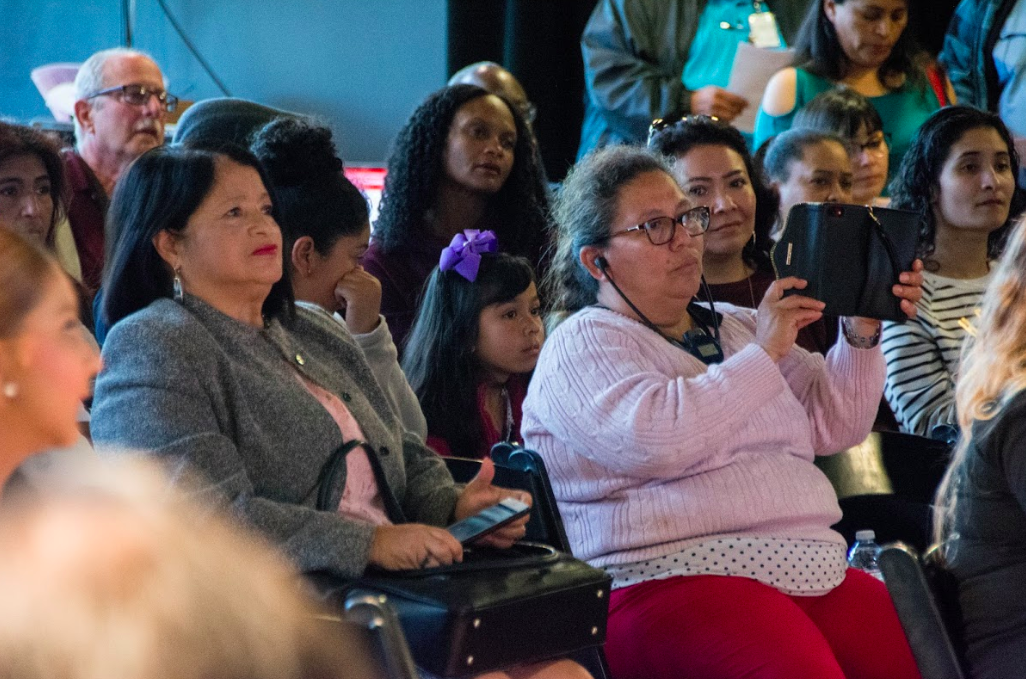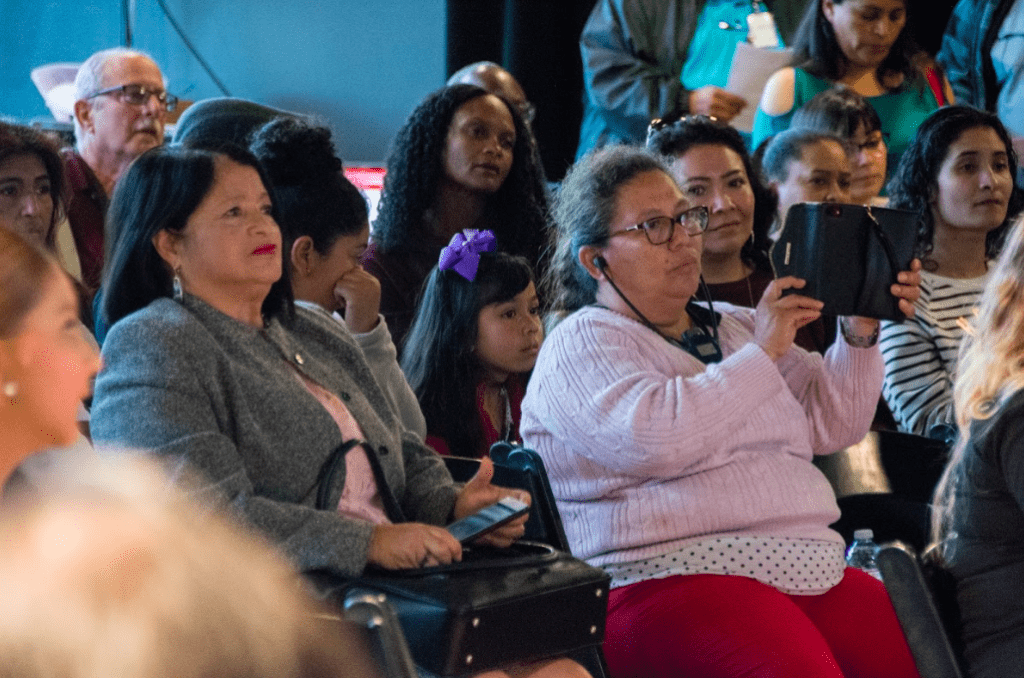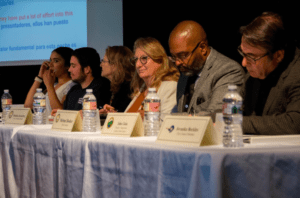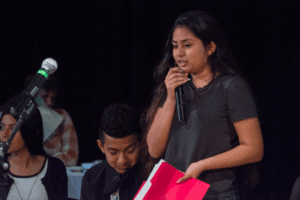
17 May WCCUSD Students and Parents Weigh In On Future of Schools

By Mitzi Perez
Guadalupe Calvario, a Richmond resident and mother of two students at Nystrom Elementary, wants to know what’s going on at her kids’ school. From events to activities and meetings that are happening, she wants information easily available so parents and students stay informed and can weigh in when it comes to bigger decisions.
“A lot of parents want to participate,” Calvario said. “I’m trying to make things change so there is more parent involvement.”
“If I don’t know about it, and I’m always at the school, then we have a problem,” she added. “It’s frustrating. We shouldn’t have to come here to fight with the school.”
Calvario was one of many parents and students from West Contra Costa Unified School District gathered at the East Bay Center for the Performing Arts earlier this month to discuss how to improve the safety, learning and welcoming climate of district schools. Attendees also provided recommendations about how school funding can help support the changes they’d like to see.
Those recommendations included how to collect data to help inform district decisions, how to show the impact of existing programs, ways to include parents, students and community in positive school climate policies and support for students and families impacted by the justice system.
The event, entitled Transparent Schools, Engaged Communities, took place on May 3 and was sponsored by Healthy Richmond — a coalition of community organizations, resident leaders and advocates focused on developing projects in the community to build lasting health equity. The organization’s School and Neighborhoods Action Team (SNAT), made up of local youth and parent leaders like Calvario, organized the meeting.
The Local Control Funding Formula, a California law enacted in 2013 that revamps how the state funds K-12 public schools, promises more state money to low-income and English Learner students. As part of this law all school districts are required to engage parents and the wider school community before setting spending priorities, known as a Local Control Accountability Plan (LCAP).
The aim of the event was to provide recommendations for the district’s LCAP and its Positive School Climate Resolution passed by the school board in November.
“That resolution [passed by the school board] is the beginning of the implementation of a series of major policy changes for the district,” Ryan Bealer, project coordinator and communications specialist with Healthy Richmond said, “connected to restorative justice and trauma informed trainings for all staff, the elimination of willful defiance suspensions, and a host of other changes meant to create a positive school climate.”
Other topics discussed at the event included how to transform the campus security officers’ program to better align with positive school climate goals and support for restorative justice techniques by providing a student training.
“We were able to connect the dots,” Calvario said. “Everyone is from different areas. It helped us have a bigger outlook on what’s going on.”
 A panel of elected officials and district staff were brought together to listen and provide feedback to parents and students. The panel included LeShante Smith, school climate coordinator; Demetrio Gonzalez, president of United Teachers of Richmond; school board members Elizabeth Block and Madeline Kronenberg; Michael T. Booker, emergency and safety preparedness point person; John Gioia, Contra Costa County supervisor and Richmond City Councilmember Jovanka Beckles.
A panel of elected officials and district staff were brought together to listen and provide feedback to parents and students. The panel included LeShante Smith, school climate coordinator; Demetrio Gonzalez, president of United Teachers of Richmond; school board members Elizabeth Block and Madeline Kronenberg; Michael T. Booker, emergency and safety preparedness point person; John Gioia, Contra Costa County supervisor and Richmond City Councilmember Jovanka Beckles.
Bealer, said the event fulfilled one of SNAT’S biggest objectives for the year.
“The event was a new approach to our team’s advocacy, to not only build stronger relationships with community leaders and decision makers, but to also create a community led space to share our recommendations and demonstrate support and unity for them,” Bealer said.
As a student who faced adversity in his school as an English learner student, Carlos Linares, a senior at El Cerrito High School, believes that the SNAT recommendations would better support him, and others like him, in school.
Linares is the co-president of his school’s Youth English Learners Advisory Committee and former youth representative on the school board.
“I also felt supported here,” Linares said, “and even more with the students and parents sharing their stories alongside me.”
In the last few years, there has been a shift on the school board and the city council to include more voices that are directly impacted by their decisions, especially the students.
“More than anything, I’m so proud of the students and parents who have already done so much work,” Bealer said. “To see their leadership grow, that’s what this is really about: students and parents building their power.”
The panelists unanimously agreed that they supported the recommendations the parents, students, teachers and community members made – and many are hopeful that their support may mean implementation down the line.
“I want to thank Healthy Richmond for the recommendations that they have made to our LCAP process, especially around the positive school climate, Superintendent Matthew Duffy, said. ” I fully support these recommendations and will work with Healthy Richmond and see how we invest in those.”
Julissa Hernandez, a ninth-grader at El Cerrito High, said she was happy that the panelists supported their recommendations.
“This [event] inspires me to do more for my community,” she said. “I feel happy and hopeful for my future.”







No Comments